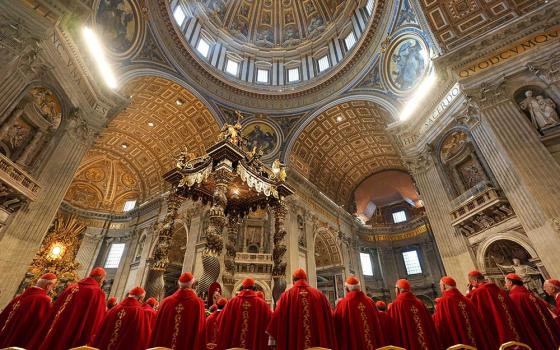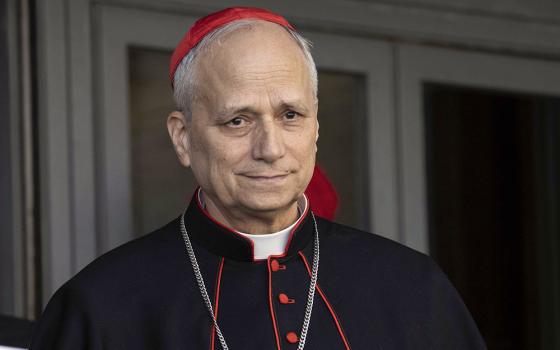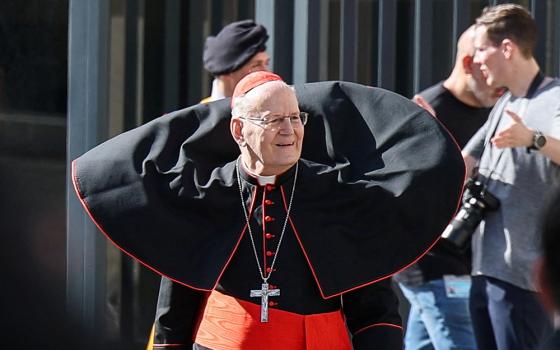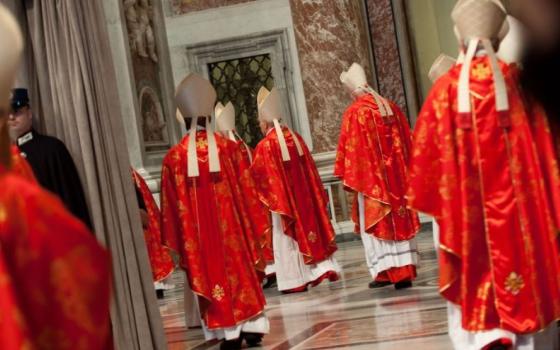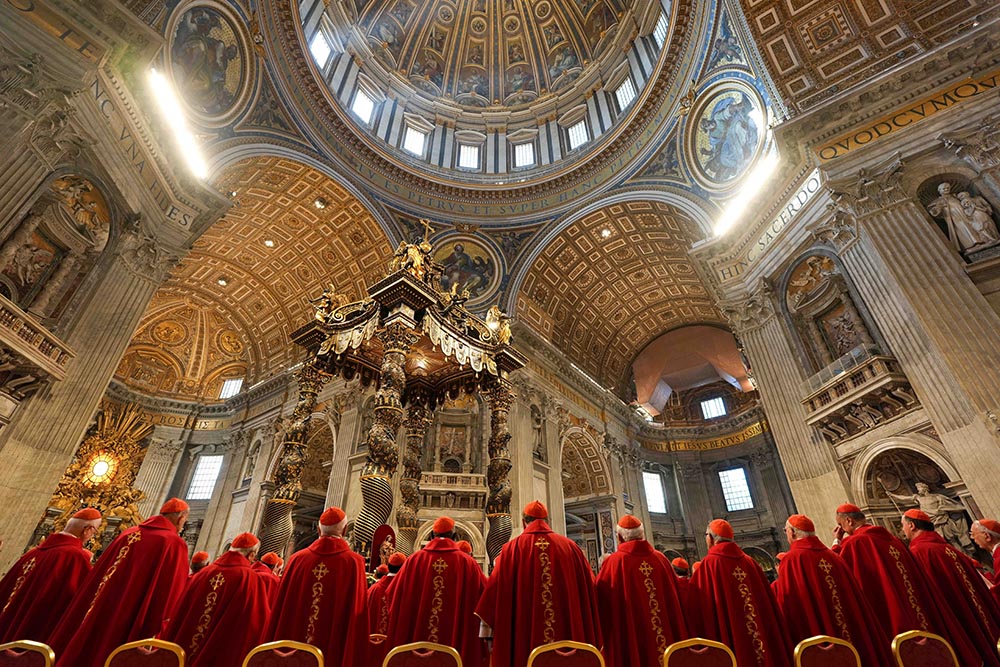
Cardinals gather to celebrate Mass with Argentine Cardinal Leonardo Sandri, subdean of the College of Cardinals, on the fifth day of the “novendiali,” nine days of mourning for Pope Francis, at the Altar of the Confession in St. Peter’s Basilica at the Vatican April 30, 2025. (CNS/Lola Gomez)
What does the world need in a new pope? This is not the primary question facing the cardinals, and it is a question that would have been inconceivable before the Second Vatican Council reclaimed the need for the church to be a witness to Christ in the world, not merely within the four walls of the church. But it is an important question, and one the cardinals should be asking themselves.
The bishops who attended Vatican II, especially the Europeans, had lived through the hell of World War II and the horrors of the Shoah. They had to ask themselves: Where was the Christian witness in those dark days? Why did most Catholics behave no differently from others?
These questions are related to the one we discussed yesterday: What does the church need in a new pope? As Pope Paul VI wrote in his 1975 apostolic exhortation Evangelii nuntiandi: "Modern man listens more willingly to witnesses than to teachers, and if he does listen to teachers, it is because they are witnesses." This insight certainly guided the teaching of Pope Francis, as David Albertson and Jason Blakely argued this week in a brilliant article at America.
The world needs a strong moral witness from the new pope. That is the default answer, and it is vital, albeit not exhaustive. We live in a time of rising authoritarianism and rapacious capitalism. Someone on the world stage has to defend human dignity and the pursuit of justice. Uniquely, a pope can take the cause of human rights out of the abstract language of law and place it in a deeply humanistic context, one rooted in Catholic anthropology.
Advertisement
In some alt-right circles, the words "social justice" are spat out as if they were swear words. When Defense Secretary Pete Hegseth shut down the Pentagon's Women, Peace and Security program, he tweeted, "WPS is yet another woke divisive/social justice/Biden initiative that overburdens our commanders and troops — distracting from our core task: WAR-FIGHTING." EWTN’s pseudo-documentary about Saul Alinsky and his association with prominent Catholic leaders like Bishop Bernard Sheil and Cardinal Joseph Bernardin was unsubtly entitled, "A Wolf in Sheep’s Clothing." It mocked the efforts of those churchmen and others to empower the poor.
Cafeteria Catholics who dismiss social justice concerns as an oddity of the Francis papacy, forget that Pope Leo XIII strongly backed labor unions and offered a profound critique of modern capitalism, Pope Benedict XV championed the cause of peace, Pope Pius XI condemned the rise of authoritarian regimes in the 1920s and '30s, and Pope Pius XII defended the rights of migrants. All this before Vatican II. Every pope since Vatican II has advanced and refined Catholic social doctrine on these and other issues. The new pope is not going to toss these teachings and this tradition overboard.
Damon Silvers, formerly the policy director and general counsel at the AFL-CIO, wrote a poignant appreciation of Francis at his substack. "Pope Francis had a clear understanding of the crisis of our contemporary world — the world financial capitalism created — clearer than any other world leader and clearer than almost all aspirants to the title of public intellectual," Silvers wrote. "He saw how climate change, inequality, and dehumanization were intertwined."
Silvers also called Francis "THE Pope of solidarity." He recalled Francis' address to the Confederation of Workers' Unions in 2017 which was the pope's most detailed defense of, and challenge to, organized labor. "He believed in the dignity of work and the value of working people, and he was deeply in sympathy with working people’s need to act collectively to ensure their lives had dignity — that they were not reduced to mere means to the ends of the wealthy and powerful," Silvers wrote.
In some alt-right circles, the words "social justice" are spat out as if they were swear words.
Powerful rightwing populists like President Donald Trump, Hungary's Viktor Orban, and France's Marine Le Pen, are succeeding in turning the working class against the poor, and especially against migrants. They also try, with great success, to turn the working class against the planet, undermining confidence in the science of climate change.
Highly educated liberals often unintentionally pave the way for these alt-right authoritarians. Climate activists rarely focus on the negative effects that good climate policy will have on working class people. Those who work in the extraction industries — in coal mines and on oil rigs — have good paying, union jobs. What is their immediate future if the mine closes, or the oil is left in the ground? Expecting workers to put concern for the ozone layer above concern to pay their mortgage is expecting too much. Those who are concerned about the environment need to do a better job defining and defending a just transition to a green economy than they have done in the past.
The new pope should look for creative ways to win the working class back to the cause of social justice, to build solidarity between the working class and the poor, to defend migrants and argue, again and again, that they are no threat to the social order if they are welcomed properly and with dignity. This solidarity can’t be restricted to papal teaching. It needs to be embodied and enfleshed in regular and routine ways.
The next pope, then, needs to be more than a moral voice. He needs to be a spiritual leader like Francis, who recognizes that, for Catholics, undergirding every instance of social injustice is sin, and every program of justice will flourish only if it is rooted in sound Christian anthropology. The next pope must, like Francis, recognize the great sin of indifference in our time, and relentlessly give voice to those who do not matter in the eyes of high finance or power politics. He will need to explain that our social doctrine is rooted in our Scriptures and in our most foundational theological doctrines about the nature of the human person. This is not mere ethics.
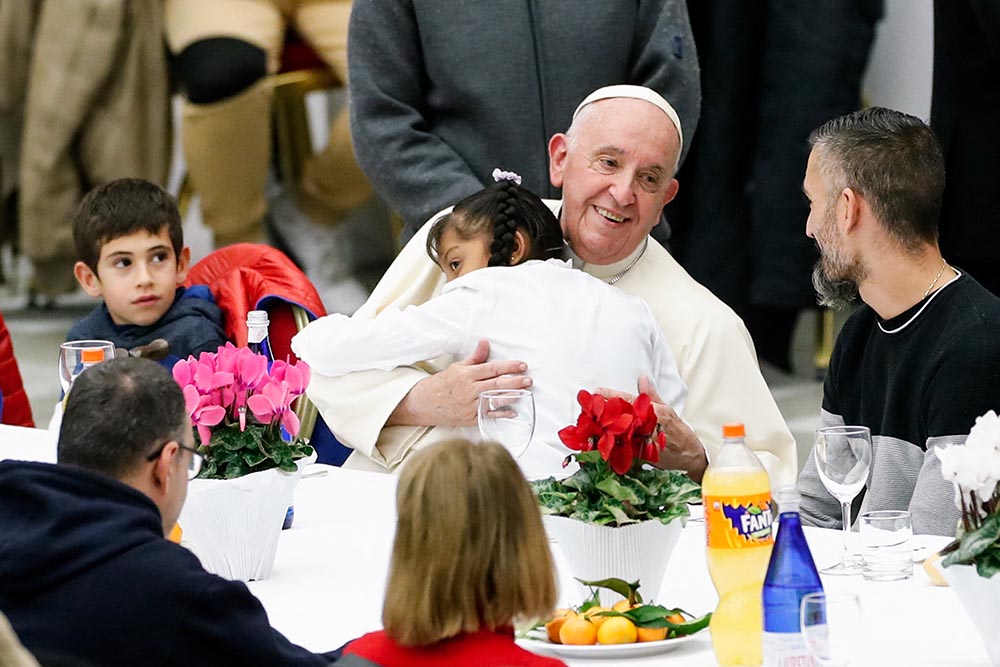
Pope Francis joins some 1,300 guests for lunch in the Vatican audience hall on the World Day of the Poor Nov. 13, 2022. Francis, formerly Argentine Cardinal Jorge Mario Bergoglio, died April 21, 2025, at age 88. (CNS/Reuters/Remo Casilli)
Sometimes, the role of moral leader conflicts with that of spiritual leader. This is especially the case on issues of war and peace. Take Ukraine. Russia is the obvious immoral aggressor and Ukraine the obvious victim of that immorality. But no one wants to return to the days when popes strapped on their armor and went to war. We need someone on the planet to constantly, insistently, advocate for peace. Balancing those two roles is always a challenge and often impossible.
Lastly, we should hope the new pope understands the relationship of moral authority in our day with material simplicity. Pope Francis' reference for the guest house over the apostolic palace, for the Fiat over the Mercedes, for the black, orthopedic shoes over the red leather slippers, was a meaningful, even arresting, witness to Gospel simplicity. If I were sitting in the general congregations, I would ask of every candidate if they grasp how integral Francis' witness was to the effectiveness of his teaching.
What the world needs from the church at this moment is another pope in the model of Francis, committed to the poor, advocating for solidarity, witnessing to Gospel simplicity in his life. There can be no going back to a papal past in which the pope is remote from the needs of ordinary persons or encumbered by papal pomp. There can be no retreat from the frontlines in the struggle for human dignity and social justice.






